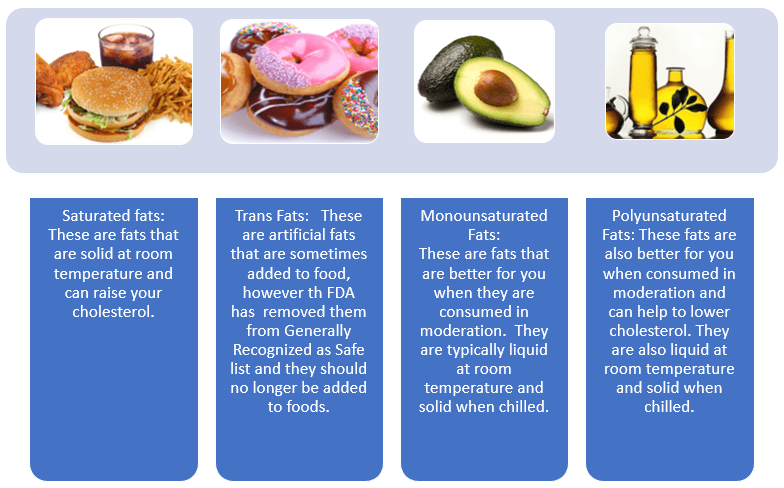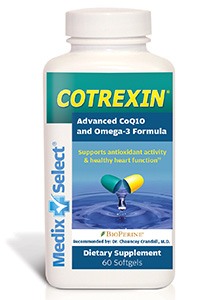What do we really know about fat other than to avoid it like the plague? This article explores fat: the good and the bad.
What is Fat?
In chemistry, nutrition, and biology, fat generally means any ester (a chemical compound derived from an acid) of fatty acids or a mixture of such compounds, most commonly those that occur in living beings and food.
Basically, fats are nutrients in food that the body utilizes to form nerve tissue, including the nerves, brain, and hormones.
What is Fat’s Function?
The body utilizes fat as a fuel supply, and fat is the primary storage form of energy in the body. Fat additionally has numerous other essential functions in the body, and it requires a modest amount in the diet for good health. However, too much fat or too much of the wrong type of fat can be unhealthy.
A modest amount of fat is a vital component of a healthy, balanced diet. Fat is a supply of crucial fatty acids that the body cannot make itself. Fat aids the body with the absorption of vitamin A, vitamin D, and vitamin E. These are known as fat-soluble vitamins.
Where is Fat Found?
Fats in food are found in several forms, which include saturated, monounsaturated, and polyunsaturated.
Some foods containing fats are butter, oil, nuts, meat, fish, and some dairy products.
Types of Fat
For good health, in the long run, some fats are healthier than others. Good fats are composed of monounsaturated and polyunsaturated fats. The bad ones contain industrial-made trans fats. Saturated fats land someplace in the middle.
All fats have a comparable chemical structure: a sequence of carbon atoms linked to hydrogen atoms. What makes one fat dissimilar from another is the length and shape of the carbon chain and the number of hydrogen atoms attached to the carbon atoms. Deceptively slight differences in structure transform into crucial differences in form and function.
Bad Fats
The worst type of dietary fat is known as a trans fat. It is a byproduct of a process called hydrogenation used to turn healthy oils into solids and prevent them from becoming rancid. Trans fats do not have any known health benefits, and there is no safe level of consumption. Therefore, they are banned officially in the United States and many other countries.
In the early 20th century, trans fats were found chiefly in solid vegetable shortening and margarine. As food makers discovered new ways to utilize partially hydrogenated vegetable oils, they commenced appearing in everything from commercial cookies and pastries to fast-food French fries.
Ingesting foods loaded with trans fats elevate the quantity of bad LDL cholesterol in the bloodstream and diminishes the amount of good HDL cholesterol. Trans fats additionally create inflammation, connected to heart disease, stroke, diabetes, and other chronic conditions. They also contribute to insulin resistance, which adds to the risk of producing type 2 diabetes. Even minute amounts of trans fats can affect health significantly: for every two (2) percent of calories from trans fat consumed daily, the risk of heart disease rises by twenty-three (23) percent.
The In-between saturated fats
Saturated fats are a regular in the American diet. They are conspicuous in that they are solid at room temperature. For example, think bacon grease when it has cooled, but what is saturated fat? Known sources of saturated fat include whole milk, red meat, and other whole-milk dairy foods, cheese, coconut oil, and numerous commercially prepared baked goods and other foods.

The word “saturated” here represents the number of hydrogen atoms encompassing each carbon atom. The chain of carbon atoms contains as many hydrogen atoms as possible. They are saturated with hydrogens.
Is saturated fat bad for you? A diet rich in saturated fats can drive up total cholesterol and tip the balance toward more harmful LDL cholesterol, prompting blockages to form in arteries in the heart and elsewhere in the body. For that reason, most nutrition experts recommend limiting saturated fat to fewer than 10% of calories a day.
A handful of recent reports have clouded the connection between saturated fat and heart disease. One meta-analysis of twenty-one studies reported that there was not enough evidence to conclude that saturated fat increases the risk of heart disease, but replacing saturated fat with polyunsaturated fat can decrease the chance of heart disease.
Two (2) other significant studies narrowed down the prescription slightly, concluding that replacing saturated fat with polyunsaturated such as vegetable oils or high-fiber carbohydrates is the best course for reducing the risk of heart disease but substituting saturated fat with highly processed fats carbohydrates could do the reverse.
Good monounsaturated and polyunsaturated fats
Good fats come primarily from nuts, seeds, vegetables, and fish. They are different from saturated fats by having a smaller number of hydrogen atoms bonded to their carbon chains. Healthy fats are not solid at room temperature but remain liquid. There are two main categories of beneficial fats: monounsaturated and polyunsaturated fats.
Monounsaturated fats – When bread is dipped in olive oil at an Italian restaurant, that action yields mainly monounsaturated fat. Monounsaturated fats have a single carbon-to-carbon double bond. The outcome is that it has two (2) fewer hydrogen atoms than saturated fat and a bend at the double bond. This composition maintains monounsaturated fats liquid at room temperature.
Good resources of monounsaturated fats are olive oil, canola oil, peanut oil, avocados, and the majority of nuts, as well as high-oleic safflower and sunflower oils.
The finding that monounsaturated fat may well be healthful came from the Seven Countries Study during the 1960s. It uncovered that individuals in Greece and other parts of the Mediterranean region enjoyed a low rate of heart disease despite a high-fat diet. However, the primary fat in their diet was not the saturated animal fat common in countries with higher rates of heart disease. It was olive oil, which contains chiefly monounsaturated fat. This finding formed a surge of interest in olive oil and the “Mediterranean diet,” which is considered a healthful choice today.
Even though there is no suggested daily intake of monounsaturated fats, the Institute of Medicine offers using them as much as possible along with polyunsaturated fats to replace saturated and trans fats.
Polyunsaturated fats – When liquid cooking oil is poured into a pan, there is a good chance that it is polyunsaturated fat. Sunflower oil, safflower oil, and corn oil are typical examples.
Polyunsaturated fats are essential fats. This statement means they are crucial for normal body functions, but the body cannot produce them. Therefore, they must be obtained from food. Polyunsaturated fats are used to construct cell membranes and the covering of nerves. They are also required for muscle movement, blood clotting, and inflammation.
A polyunsaturated fat has two or more double bonds in its carbon chain. There are two (2) principle categories of polyunsaturated fats: omega-3 fatty acids and omega-6 fatty acids. The numbers signify the extent of the distance between the beginning of the carbon chain and the first double bond. Both types offer health benefits.
Consuming polyunsaturated fats instead of saturated fats or highly refined carbohydrates lowers harmful LDL cholesterol and improves the overall cholesterol profile. It additionally lowers triglycerides (the main ingredient of natural fats and oils).
High-quality sources of omega-3 fatty acids include fatty fish such as mackerel, salmon, and sardines, canola oil, flaxseeds, walnuts, and unhydrogenated soybean oil.
Omega-3 fatty acids can help prevent as well as treat heart disease and stroke. On top of raising HDL, reducing blood pressure, and lowering triglycerides, polyunsaturated fats can aid with the prevention of lethal heart rhythms from arising. Data additionally suggests they can help diminish the need for corticosteroid medications in people with rheumatoid arthritis. Research linking omega-3s to a wide range of other health improvements, including reducing the risk of dementia, is inconclusive. According to a systematic review of the Agency for Healthcare Research and Quality evidence, some of this research has significant flaws.
Omega-6 fatty acids are additionally linked to protection against heart disease. Foods abundant in linoleic acid and other omega-6 fatty acids include vegetable oils such as walnut, safflower, sunflower, soybean, and corn oils.
For individuals who feel that their diet does not ultimately provide the benefits of consuming the good fats, supplementation may be an avenue to explore.
There is a premium supplement that:
- Supports heart health and function
- Supports proper inflammatory response
- Reduces oxidation of cholesterol
- Supports brain health
- Supports circulatory health
- Supports energy production
This supplement is called Cotrexin. Cotrexin is a premium CoQ10 and Omega-3 dietary supplement that sustains antioxidant function and
healthy heart activity. CoQ10 is an enzyme shown to help improve heart health and blood sugar regulation.
This advanced formula was produced by renowned Cardiologist Dr. Chauncey Crandall and includes Bioperine, which can drastically enhance the absorption and bioavailability of CoQ10. Higher absorption converts into strengthened support of the cardiovascular system, fewer free radicals produced, improved performance of the mitochondria, and increased energy, stamina, and endurance. These powerful ingredients in the Cotrexin formula may provide the above benefits.
Fat is a substance that is very beneficial for the body. However, as with so many other substances, it must be consumed carefully.
Any questions, comments, concerns, or experience with the subject may be left below.
Good Health!!

I am glad to hear that can lower blood pressure. Someone once told me that omega-3 fatty acids help fight disease by reducing inflammation in the blood vessels, joints, and elsewhere.
I understand we must get omega-3 fatty acids from foods or supplements since our bodies cannot make them. Is that true?
Yes, it is true that the body cannot produce Omega-3 fatty acids even though they are essential fats.
Nice and very informative article about everything that has to do with body fats. There are a huge number of products out there concerning fat either for fast absorption or similar supplements but while many of them are good for the body we should always consult a doctor before even thinking of taking any of them. At least this is my opinion for all these similar products.
You are correct Stratos, it is always best to consult a physician.
Thanks for commenting!